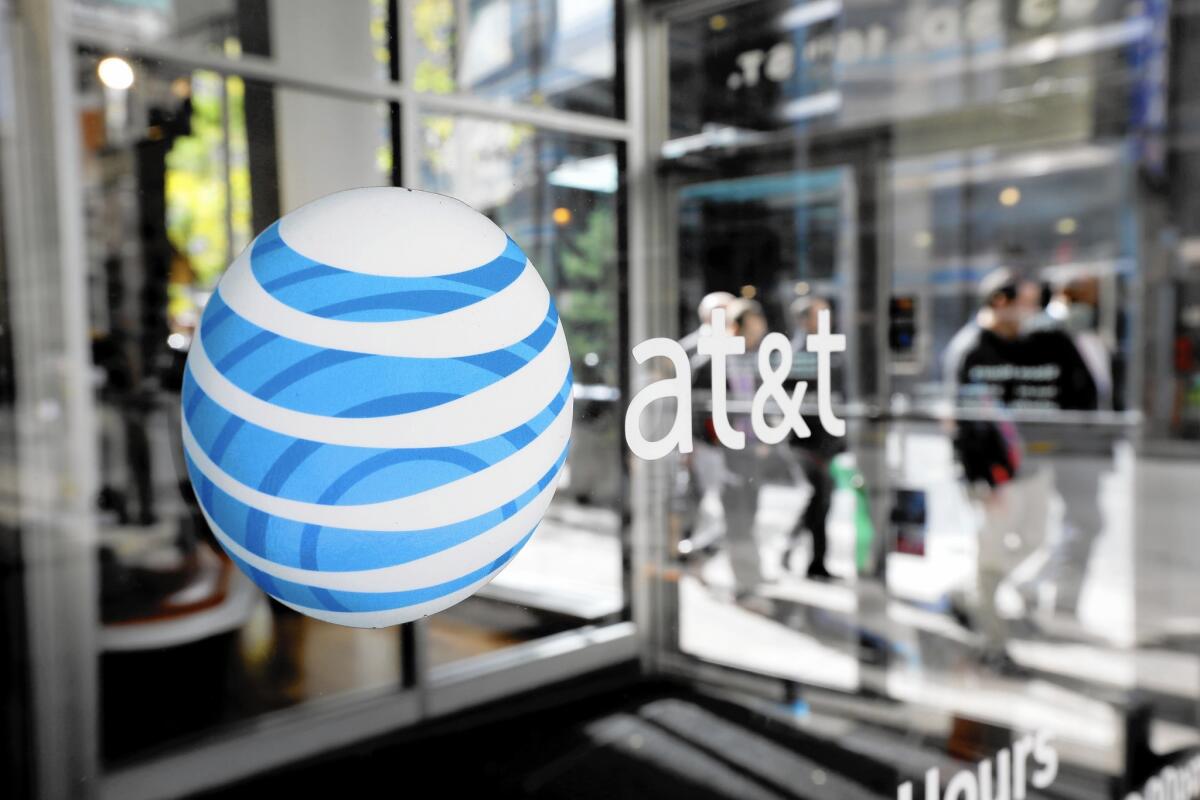Column: Will AT&T follow Verizon in selling its California landline network?

Frontier Communicationsâ bumpy takeover of Verizonâs landlines in California raises a question about the fate of the stateâs other big controller of copper wires. Is AT&T also looking to unload its landline network?
The answer is a resounding maybe.
At issue are the copper phone lines that for decades have connected peopleâs homes to AT&Tâs network. Theyâre good for basic phone service and relatively slow DSL Internet access, as opposed to fiber-optic lines that carry super fast services such AT&Tâs U-verse TV system.
Iâve spoken with a number of telecom industry players and analysts, and the general consensus is that AT&T sees no future in copper landlines â but the company isnât in as big a hurry as Verizon to go digital-only.
âI donât think itâs in AT&Tâs interest to maintain all those copper wires,â said Paul Glenchur, senior telecom analyst at Potomac Research Group in Washington, D.C. âGradually, theyâll want to replace them.â
AT&Tâs chief executive, Randall Stephenson, repeatedly has indicated that the company aims to abandon outdated technology by the end of the decade.
In a 2013 letter to shareholders, he said that AT&T is âputting software rather than hardware at the heart of our network infrastructure,â and that âweâve committed to upgrading all of our customers to new technology by 2020.â
In recent days, I spoke with several AT&T technicians, each of whom asked to remain anonymous to avoid reprisals. They said supervisors statewide are alerting workers that the companyâs traditional copper-wire network and central switching offices will start being phased out beginning in 2018.
Theyâre also saying that one scenario being discussed among AT&T insiders is for Frontier to acquire AT&Tâs California landline phone network, just as it did April 1 with Verizonâs system.
AT&T and Frontier arenât strangers. In 2014, Frontier spent $2 billion purchasing AT&Tâs landlines in Connecticut. Frontier subsequently issued $10 million in credits to customers to atone for a less-than-seamless transition.
I spoke with Ken McNeely, president of AT&T California. He said itâs âunlikelyâ that the company will sell its landline network in the state.
âWe are not looking to do that,â he said.
I conveyed what Iâd been hearing from the companyâs technicians â that supervisors are notifying staff about old technology being put out to pasture.
McNeely didnât deny such meetings are taking place. âWeâd be negligent if we werenât already training our technicians in new technology,â he said.
So, on the one hand, AT&T says itâs aiming to have all customers using ânew technologyâ by 2020 and admits itâs preparing staffers for a digital future. On the other, it says there are no plans to jettison the old-school copper wires now running into many peopleâs homes.
If I had to guess, Iâd say the company is trying to have it both ways to avoid talking down the value of its landline network prior to a possible sale.
For what itâs worth, I also spoke with Melinda White, Frontierâs regional president. She said she wasnât aware of any talks with AT&T about acquiring the companyâs California landlines.
Yet AT&T has been busy in Sacramento trying to pass legislation that would â yup â make it easier to get rid of its copper landlines by 2020.
Assemblyman Evan Low (D-Campbell) introduced a bill this month that would allow phone companies to kill off copper and switch all phone service to wireless and high-speed Internet systems.
He said this legislation, AB 2395 is needed âbecause right now we have a 21st-century economy operating on a 20th-century IT network.â AT&T is a key backer of the bill.
However, critics say the true intent of the legislation is to allow AT&T to stop investing in rural areas where copper landline networks are expensive to maintain.
âRather than modernizing phone service, this bill would take us back to the dark days when consumers were totally at the mercy of AT&T,â said Mark Toney, executive director of the advocacy group Turn. âIt would eliminate the most basic consumer protections, regardless of the enormous impact abandoning copper could have on emergency services and vital communications.â
Rural County Representatives of California, another advocacy group, said the legislation would âallow a mechanism for legacy carriers to relinquish their decades-old obligations that guarantee basic two-way telephone service via a landline.â
AT&Tâs McNeely said the bill is aimed mainly at educating California consumers about their telecom choices. He said 85% of AT&Tâs customers already receive phone service via broadband Internet connections or mobile devices, so the important thing is to allocate resources appropriately.
âWith each passing year, the copper network becomes less and less efficient,â McNeely said. âIf no oneâs using it, let us turn it off.â
Or sell it, presumably.
Which brings us back to where we started: Will AT&T follow Verizon in selling its landlines to Frontier?
Could be. Or not.
All we know at this point is that AT&T is definitely gearing up for changes, and those changes definitely involve its landlines.
Oh, and we also know that when Frontier says it expects the transition from one provider to another to go seamlessly, a lot of people are probably going to experience seams. As of Monday, I was still getting dozens of emails daily from former Verizon customers griping about service disruptions.
The email address once again to reach White, Frontierâs regional president, is [email protected].
David Lazarusâ column runs Tuesdays and Fridays. He also can be seen daily on KTLA-TV Channel 5 and followed on Twitter @Davidlaz. Send your tips or feedback to [email protected].
MORE FROM DAVID LAZARUS
Robocalls driving you nuts? A proposed law offers a remedy
Does your credit card contract contain a hidden surprise?
Switch to Frontier causes glitches for some former Verizon customers
More to Read
Inside the business of entertainment
The Wide Shot brings you news, analysis and insights on everything from streaming wars to production â and what it all means for the future.
You may occasionally receive promotional content from the Los Angeles Times.











